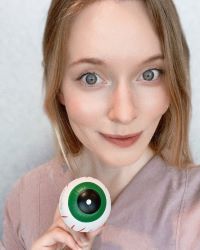Oct. 10, 2023
All in the mind’s eye
Alexandra Wolf, Special Postdoctoral Researcher
Please describe your role.
I am a Special Postdoctoral Researcher at the RIKEN Center for Advanced Intelligence Project in Tokyo, Japan. I am part of a program that aims to nurture young scientists to help them make significant global contributions to research. This program provides creative researchers like me with the opportunity to pursue self-directed and independent research aligned with RIKEN’s objectives.
My focus lies in exploring eye movements in two groups: healthy older adults and older adults with mild cognitive impairment (MCI). By studying eye movements, I aim to contribute to our understanding of age-related cognitive decline and potentially develop diagnostic tools and interventions for MCI.
How did you become interested in your current field of research?
My passion for psychology and photography sparked a deep curiosity about how people perceive the world. This led me to delve into the fascinating field of eye tracking. Initially captivated by studying eye movements among healthy participants during my PhD projects, I soon recognized the need to expand my research to include clinical groups. Exploring gaze patterns in individuals with clinical conditions allowed me to uncover unique insights and understand the impact of these conditions on visual perception and cognition. This broader perspective revealed diverse visual impairments within clinical populations.
Why is your research important?
Addressing age-related cognitive decline, particularly in those with MCI, is the driving force behind studying eye movements in older adults. Eye movements provide valuable insights into attention, perception and memory. By examining eye movements in both healthy older adults and those with MCI, we aim to uncover potential biomarkers and early indicators of cognitive decline. This research holds the potential to develop practical and effective diagnostic tools for MCI and other age-related cognitive disorders.
Why did you become a scientist?
My decision to pursue a career as a scientist evolved gradually, influenced by mentors from prestigious institutions like Warsaw University of Life Sciences, Technical University Munich and Kyushu University. I participated in exceptional international exchanges, which nurtured my curiosity and instilled the confidence needed to make a meaningful impact through my work. Hence, it was through the accumulation of these experiences and the unwavering support of my parents that the picture of my career as a scientist began to crystallize during my years of education.
Please tell us about your professional and personal goals.
Despite my origins in Europe, I have been raised with the mindset of considering myself a ‘global citizen’. I totally embrace this perspective, which motivates me to fulfill my responsibilities and obligations to my family, community and society as a whole. I believe in embracing the inherent equality and dignity of all individuals, regardless of their background. The values of active engagement, meaningful science communication, and striving for the betterment of society should be universal and inclusive. By upholding these ideals, I seek to promote positive change—for all.
Rate this article

